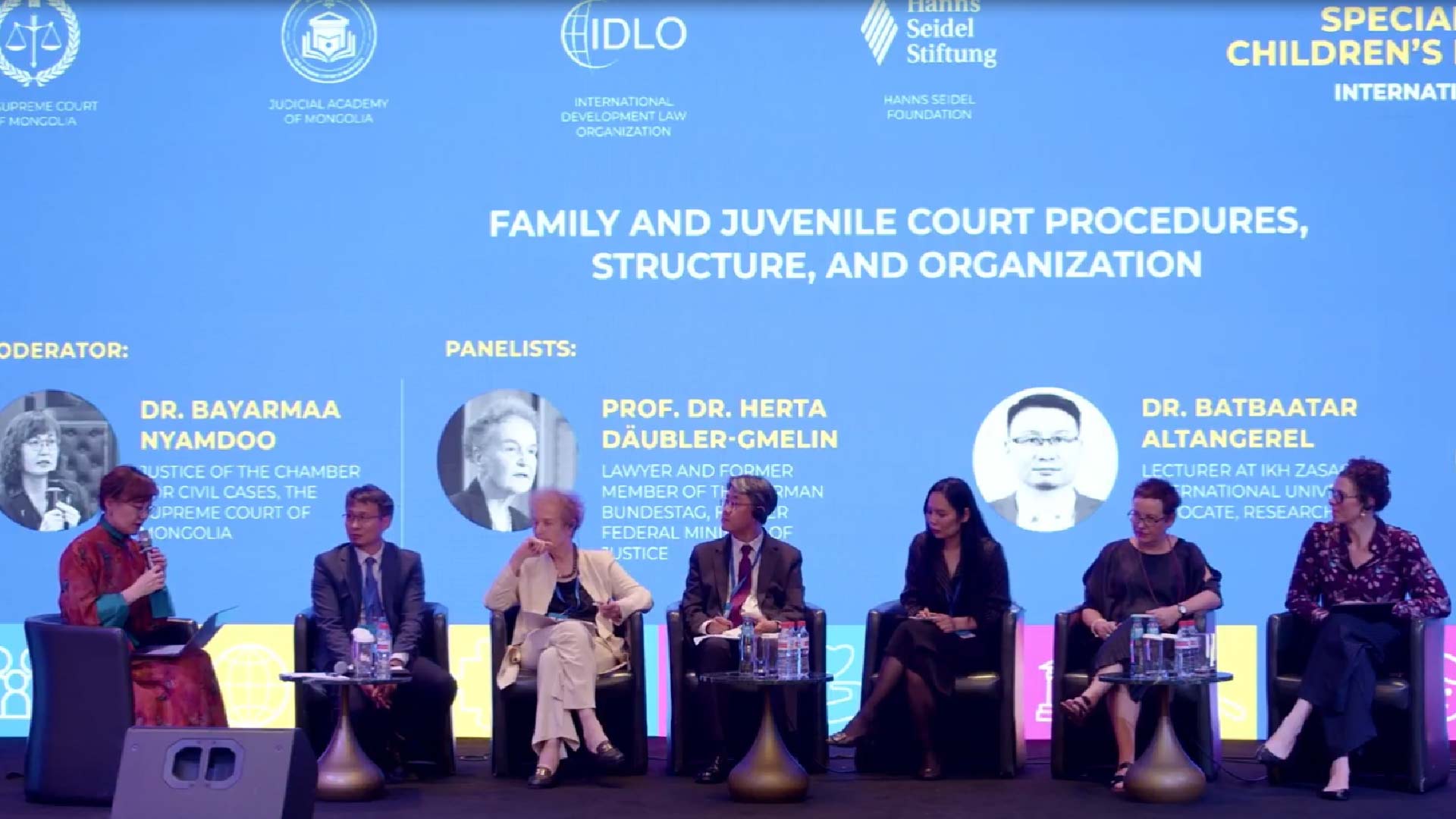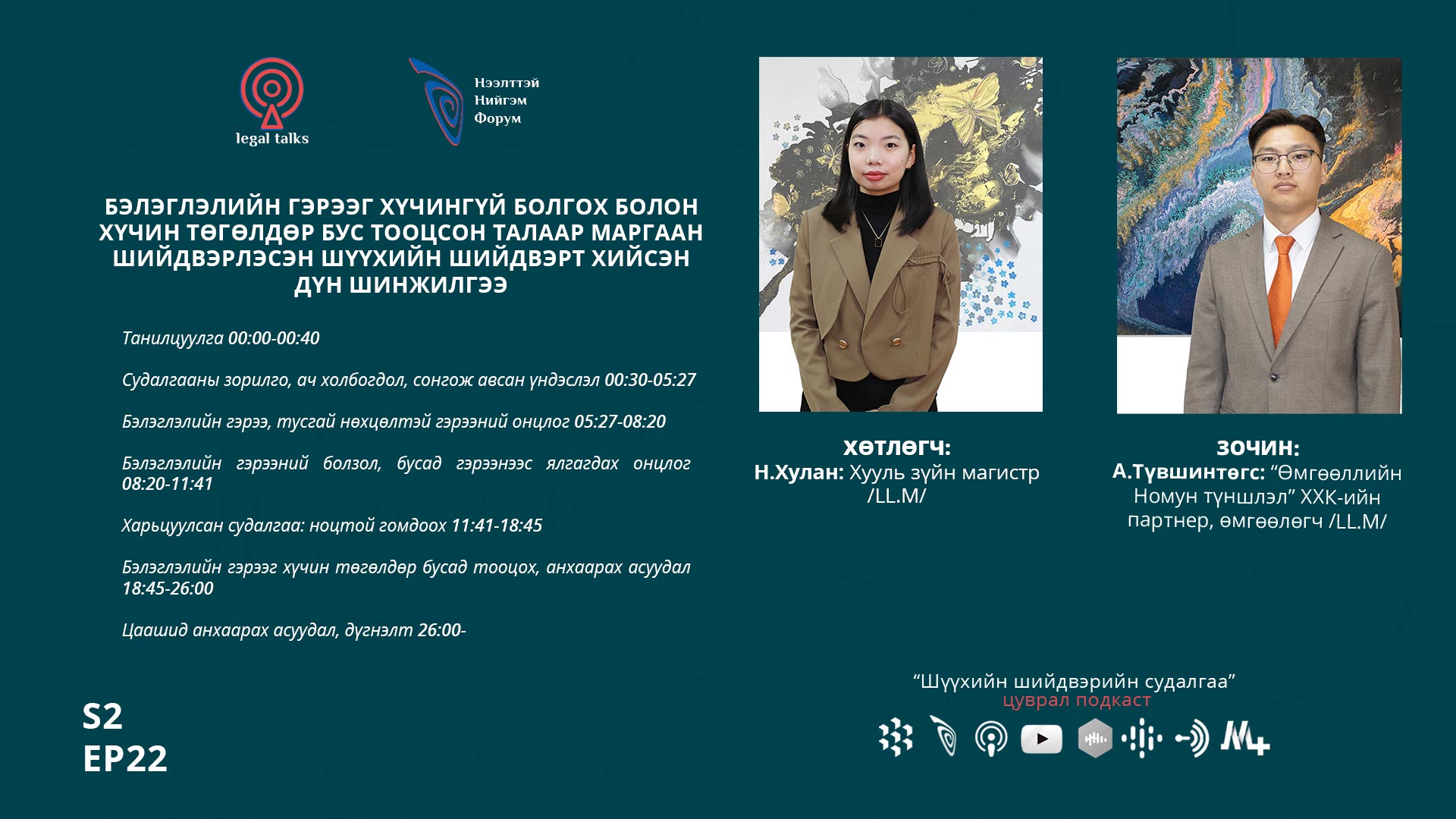The death penalty is a multifaceted and controversial topic within the scope of human rights, justice, and criminal policy. This article examines the abolition and potential reinstatement of the death penalty from the perspectives of international law, the Constitution of Mongolia, the Criminal Code, practical conditions, and criminological theory. Although Mongolia has abolished the death penalty from its Criminal Code, the provision related to the death penalty remains valid in the Constitution, thus leaving the legal possibility for reinstatement open. The article emphasizes that the focus on protecting the right to life of criminals often neglects the right to life of victims and public safety. It argues that the death penalty may serve as a tool for ensuring justice, deterring crime, and influencing political, economic, and international relations. However, strong opposition to the death penalty persists due to commitments under international treaties, human rights principles, and the risk of wrongful convictions. The article highlights the importance of resolving death penalty-related issues through comprehensive research and open public discourse, taking into account Mongolia’s international obligations, balanced protection of human rights, level of societal development, and public opinion.
The death penalty is a multifaceted and controversial topic within the scope of human rights, justice, and criminal policy. This article examines the abolition and potential reinstatement of the death penalty from the perspectives of international law, theConstitution of Mongolia, the Criminal Code, practical conditions, and criminological theory. Although Mongolia has abolished the death penalty from its Criminal Code, the provision related to the death penalty remains valid in the Constitution,thus leaving the legal possibility for reinstatement open.The article emphasizes that the focus on protecting the right to life of criminals often neglects the right to life of victims and public safety. It argues that the death penalty may serve as a tool for ensuring justice, deterring crime, and influencing political, economic, and international relations. However, strong opposition to the death penalty persists due to commitments under international treaties, human rights principles, and the risk of wrongful convictions.The article highlights the importance of resolving death penalty-related issues through comprehensive research and open public discourse, taking into account Mongolia’s international obligations, balanced protection of human rights, level of societal development, and public opinion.
Human rights, right to life, victim’s right to life, death penalty, human development
Бүртгэлтэй бол нэвтрэх | Бүртгэлгүй бол бүртгүүлэх
[1] Amnesty International reports only on executions, death sentences and other aspects of the use of the death penalty, where there is reasonable confirmation. In many countries governments do not publish information on their use of the death penalty. Therefore, for many countries, Amnesty International’s figures on the use of the death penalty are minimum figures. The true overall figures are often likely to be higher. https://www.amnesty-international.be/sites/default/files/
[2] Unted nations: Universal declaration of human rights: “Human rights are the basic rights and freedoms that all people have, regardless of their status. They are based on values like dignity, fairness, and equality.” https://www.un.org/en/about-us/universal-declaration-of-human-rights
[3] The Second Optional Protocol to the International Covenant on Civil and Political Rights: https://www.ohchr.org/en/instruments-mechanisms/instruments/second-optional-protocol-international-covenant-civil-and
[4] МУ-ын Үндсэн Хууль: 16 дугаар зүйл: “1/Амьд явах эрхтэй. Монгол Улсын Эрүүгийн хуульд заасан онц хүнд гэмт хэрэг үйлдсэний учир шүүхийн хүчин төгөлдөр тогтоолоор ялын дээд хэмжээ оногдуулснаас бусад тохиолдолд хүний амь нас бусниулахыг хатуу хориглоно”
[5] Cesare Beccaria (born March 15, 1738, Milan [Italy]—died November 28, 1794, Milan) was an Italian criminologist and economist whose Dei delitti e delle pene (1764; Eng. trans. J.A. Farrer, Crimes and Punishment, 1880) was a celebrated volume on the reform of criminal justice. https://www.britannica.com/biography/Cesare-Beccaria
[6] Classical & Rational Choice Theories- cонгодог, ухамсарч сонголтын онол
[7] The Human Development Index (HDI) is a summary measure of average achievement in key dimensions of human development: a long and healthy life, being knowledgeable and having a decent standard of living. The HDI is the geometric mean of normalized indices for each of the three dimensions. https://hdr.undp.org/data-center/human-development-index#/indicies/HDI
[8] Human Development and Criminal Careers: https://www.taylorfrancis.com/chapters/edit/10.4324/9781003060581-17/human-development-criminal-careers-david-farrington#:~:text=ABSTRACT,child%20were%20all%20important%20predictors.
[9] Relationship between human development and drug use. Human development index and drug use. https://www.scielo.org.mx/scielo.php?script=sci_arttext&pid=S0185-33252014000100005#:~:text=High%20development%20index%20implies%20that,of%20life%20or%20well%2Dbeing.
[10] Jamaliah Jamaliah, Elyta Elyta Vol 4, No 1 (2022): “The Effect of Human Development Index (HDI) on Poverty and Crime in West Kalimantan, Indonesia”.
МЭДЭЭ, МЭДЭЭЛЭЛ

“Дагнасан шүүхийн тогтолцоо: Хүүхдийн эрх ашиг ба гэр бүл” олон улсын эрдэм шинжилгээний хурал (III хэсэг)
1 day ago

“Дагнасан шүүхийн тогтолцоо: Хүүхдийн эрх ашиг ба гэр бүл” олон улсын эрдэм шинжилгээний хурал (II хэсэг)
3 days ago

S2EP22. А.Түвшинтөгс: Бэлэглэлийн гэрээг хүчингүй болгох болон хүчин төгөлдөр бус тооцсон талаар маргаан шийдвэрлэсэн шүүхийн шийдвэрт хийсэн дүн шинжилгээ
5 days ago

“Дагнасан шүүхийн тогтолцоо: Хүүхдийн эрх ашиг ба гэр бүл” олон улсын эрдэм шинжилгээний хурал (I хэсэг)
5 days ago
ШҮҮХИЙН ШИЙДВЭРИЙН ХУРААНГУЙ
-
Даатгуулагч нэн даруй мэдэгдэх үүргээ биелүүлээгүй нь даатгагчийн ашиг сонирхолд ноцтой хохирол учруулаагүй бол нөхөн төлбөрийг төлөх үүрэгтэй
2025-06-29
-
Түр саатуулах хугацаа тооцох заалт нь Үндсэн хууль зөрчсөн тухай Цэцийн дүгнэлт (2024, №03)-ийн тойм
2025-06-27
-
Ашиглалтын тусгай зөвшөөрөл бүхий талбайн газрын төлбөрийг уурхайн эдэлбэр газрын хэмжээгээр ногдуулж төлнө
2025-06-27
-
Эрхэмбаярын Энхцэцэг
2025-07-01 Эрдэм шинжилгээний өгүүлэлдуудаж байна ! -
Нээлттэй Нийгэм Форум Ө.Болортуяа, Б.Ганцэцэг, М.Насанбат, Н.Номинзул
2025-06-30 Эрх зүйн шүүмждуудаж байна ! -
Элбэгзаяагийн Төгстөгөлдөр
2025-06-30 Эрдэм шинжилгээний өгүүлэлдуудаж байна ! -
Ганбат Мөнхтулга
2025-06-26 Эрдэм шинжилгээний өгүүлэлдуудаж байна ! -
Батсайханы Мөнхзул
2025-06-26 Эрдэм шинжилгээний өгүүлэлдуудаж байна ! -
Ганбат Мөнхтулга
2025-06-25 Эрдэм шинжилгээний өгүүлэлдуудаж байна ! -
Баатарын Сарантуяа
2025-06-24 Эрдэм шинжилгээний өгүүлэлдуудаж байна ! -
Ганбат Мөнхтулга
2025-06-24 Эрдэм шинжилгээний өгүүлэлдуудаж байна ! -
Judilogy
2025-06-23 Мэдээллийн хуудасдуудаж байна ! -
Ганбат Мөнхтулга Нэрэндашийн Дуламсүрэн
2025-06-23 Эрдэм шинжилгээний өгүүлэлдуудаж байна !